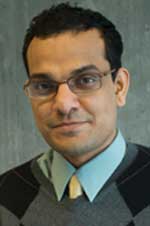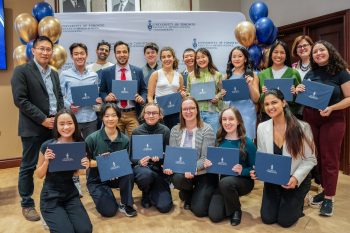 From the breakdown of natural wastes to the production of fossil fuels, many fundamental processes on Earth are performed by organisms too small for the eye to see.
From the breakdown of natural wastes to the production of fossil fuels, many fundamental processes on Earth are performed by organisms too small for the eye to see.
Professor Radhakrishnan Mahadevan (ChemE) specializes in the utilization of these vital micro-organisms, and this month his groundbreaking research landed him the Canadian Society for Chemical Engineering’s Syncrude Canada Innovation Award.
Professor Mahadevan’s innovative research in metabolic engineering, synthetic biology and bioinformatics – best understood as the collection and analysis of complex biological data – is internationally recognized. Applying recent advances in bioinformatics and bioengineering to significant real-world engineering challenges, his lab has developed complex computer models that accurately reproduce in silico all of the metabolic processes in a living organism. These sophisticated technologies illuminate the fundamental biochemical processes that underpin life, and can be used to develop new biotechnologies for a very wide range of sectors.
The goal of Mahadevan’s research is to engineer and optimize micro-organisms to efficiently perform chemical conversion processes for use in industrial and environmental applications. These include sustainable manufacturing of chemicals and materials from renewable biomass instead of fossil fuels, biological remediation of environmental pollution, biological pharmaceuticals production and the recovery of energy from waste streams using microbial processes.
Learn more about Professor Mahadevan’s Laboratory for Metabolic Systems Engineering.
The Syncrude Canada Innovation Award is presented to an individual under the age of 40 for a distinguished contribution to the field of chemical engineering while working in Canada. The award will be presented at the 64th Canadian Chemical Engineering Conference in Niagara Falls, ON, Oct 19-22, 2014.



